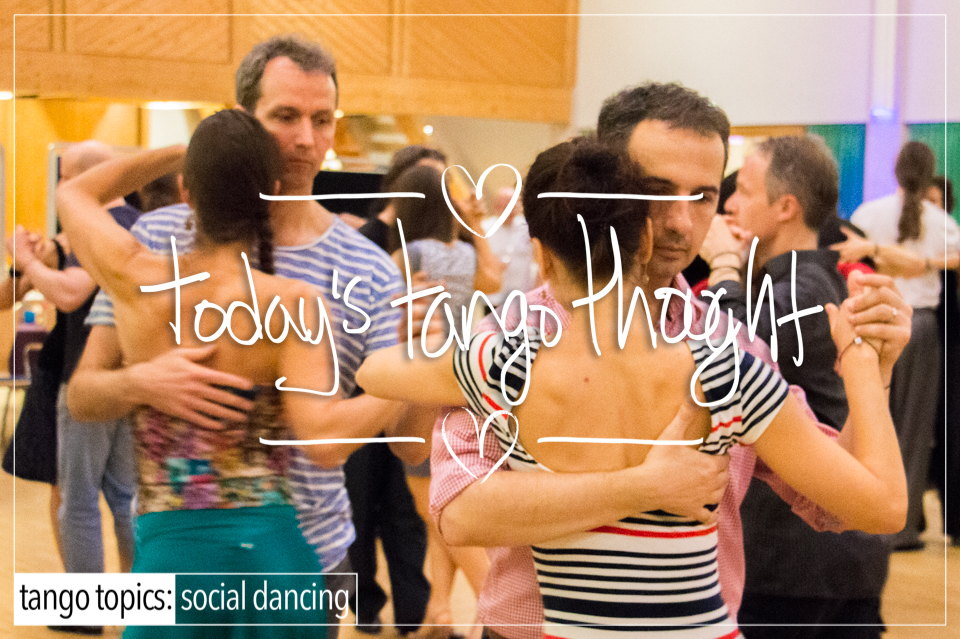There’s that row of men that stand at every milonga. They hover. They waver from side to side. They stand with their arms crossed. All by themselves. They never sit, and they seemingly never dance. There’s usually a row of them, more than 3 or 4. And no matter what happens, you almost never see them dance. There’s a reason for that. It’s because a good portion of the better Followers in the room has had a less than desirable experience with them.
To be fair they could be standing all in a row because:
They’re hot and cooling off (Possible).
There is no one they like to dance with (Possible).
They can cabeceo better from a standing position (Possible).
They’re enjoying a moment of solitude that lasts for 3 or 4 hrs at a Milonga (Ummm).
They’re enjoying the solemnity of not dancing with anyone, Phhhhffft! (Not!).
They like standing there holding up the wall (Seriously ?).
As snobby and elitist as this will sound, there are some very good reasons why they’re standing there, and not engaging in the social atmosphere, and/or dancing:
1.) Only the uninformed, uninitiated, and ignorant are dancing with them.
2.) One word for you ‘Creepy’. Read that as lacking clear boundaries or social mores!
3.) They reek! The odor is quite palpable, and no one has bothered to explain it to them.
4.) Quite possibly they’ve stepped on enough feet that women (thankfully) are refusing their cabeceo on a regular basis.
5.) Their floorcraft execution is less than desirable.
6.) Their choice of the same vocabulary over and over and over again, plus the pushing, the pulling, the looking at the Follower’s feet the entire time, while not coming anywhere close to a beat is rather off-putting.
To be fair to the socially ignorant, there is a very small sliver of the male tango populace that has a real hard time with engaging in a social dynamic. They’re put off and overwhelmed by X, Y, and Z, and quite honestly don’t know how and what to do with it all. And the dancing part ? Is just waaaay over their heads. Everyone else seems to be having fun, but these guys are completely lost.
So let’s speak to that for a moment because it’s important to distinguish the timid, or shy guy from the Row of Men that Stand. They’re not the same person. A timid or shy person has issues with being in a public place and finding their space because the social dynamics are either too damned confusing for them, or they honestly don’t know how to engage in it. It’s not a deficiency in their ability to dance. It’s a deficiency in their ability to be social. Truthfully they’re probably wonderful dancers, and/or would be wonderful with some attention, love, and care from a teacher that took a shine to them (a liking). They’re like plants that just need some sunshine and some water, and they’ll do the rest.
While we’re on the subject of male leads that should not be confused with the Row of Men that Stand: The Guy Looking for a Better SightLine for Better Cabeceo. This guy may be temporarily joining the row, on an intermittent basis but it’s important to note that he’s actively cabeceo-ing potential Followers and is getting dances left, right, and center as he wants. He’s actually a half-way decent dancer truthfully. Half-way decent in the respect that he understands the vocabulary of the dance. He understands the music to a point (to a point, but not really). And he understands an embrace (to a point). But he, like the timid Lead above, needs a very clear, salient, and determined Lead teacher to show him that vocabulary is not the end all be all. That you can do an enormous amount with just walking. That there is a reason the music is there, and it’s not to service their wild fantasies of 72 Sacadas in 3 minutes! And finally, they’d have happier Follower if they learned not to push, pull, and squeeze the living daylights out of their partners. But no one has told them this stuff, and further, they’ve reached that point in their tango development as to be hard of hearing about this stuff. So it will take feedback from a very honest and clear teacher to explain it to them like a five-year-old to get them to stop doing what they’re doing and instead do something entirely different: Be pleasant!
The Tango Topics Opinion. To be clear and fair, this thought is not Lead Bashing, not by any stretch of the imagination. Why ? Because this topic is only pointing out one tiny aspect of what’s going on for that 5% of the room that engages in this practice of being slightly antisocial, which oddly enough, just so happens to coincide with less than desirable dancing (usually). Quite honestly these men could become lovely leads, if 2 things were true, which invariably they won’t be unless: 1.) Someone invests a little time in them to inform them of the 6 things above. and 2.) They invest in themselves with private lessons, and stop pulling, pushing, squeezing, compressing, and teaching their followers at a milonga especially when they’re not professional teachers!
There are 4 options for the Row of Men that Stand:
1.) Continue to stand.
2.) Learn to Follow. Which means changing your shoes, and then find a Lead to dance with!
3.) Go home. That solves nothing except to assuage the immediacy of the problem.
4.) Private Lessons!
Let’s talk about that last option: Private Lessons. Let’s assume for the moment that you decide that a private lesson a week will help. It won’t. Let’s also decide that you’ve been to BsAs, or study with the local “Mariana” and that she tells you frequently that you’re doing great! (you’re not) Let’s also assume that you’ve been at this a while. True! You have.
All that being said. You have issues the size of Montana (pushing, pulling, compression, looking at the Follower’s feet, pulling your head away, tilting your head into your Follower’s head, too much vocabulary, not following the beat of the music, not invoking the musical pauses of the music, not paying attention to the line of dance, invoking repetitive vocabulary, just to name a few). But for the moment let’s assume that you believe that a singular private lesson will address your issues. That’s 1 hour per week. It’s not enough. Said private lessons are going to take a while, a long while to address your issues. All true.
Well, the latter part of that statement is true. However, a singular private lesson will change nothing. The issue that has to change is not necessarily in Mariana or what she’s on about, it’s in your head! Getting your head on straight as there are a few things that you need to consider going forward so that you’re not in that Row of Men that Stand.
First and foremost, do you want to be in that row ? Probably not. No one does. But the row happens anyway.
Secondly whomever the local “Mariana” is, she’s more than likely keeping you on as a student for a few reasons which have nothing to do with Tango. He’s got his bills to pay, you dig ? Let’s put it this way, if you’ve been studying with X for longer than 6 months and your dancing is doing exactly what it was doing before you started with X, then you know what ? It’s time to get rid of that teacher. A teacher should clean up your dance. They should make a noticeable impact on your form, your embrace, your walk. Etc. However, and while this one is a choice, they should also start to address the other problem that you have very little control over. And that’s the Tango Baggage issue. Please go follow the link, as we’re not going to discuss what that is here. Suffice it said, if said Teacher doesn’t address that issue, then you’re going to sit. And no matter how many lessons you’ve had, or how much you work on your technique if there’s no one there to show off what you can do in the arms of a proper and skillful Follower then you’re going to continue to occupy a place of honor in the Row of Men that Stand.
Thirdly, you have to make a conscious choice in the cost to tango ratio. Which goes something like this: If the milonga is 10 dollars. This milonga is 4 hours long, and there are about 6 tandas in an hour. And there are 50 potential leads in the room. That means that you have 24 potential opportunities to dance in a particular milonga. Assuming that the DJ plays a typical 443, 4 Tangos, 4 Vals, and 3 Milonga, in the following structure of 2 Tangos, 1 Milonga, 2 Tangos, 1 vals, and so on, and there are acceptable Milonga partners to dance with. You have 24 potential opportunities. That means for your 10 dollars, each tanda costs you $00.41 cents. Now we add in how much your privates are costing you, say 2 a week, so the cost goes up from 41 cents to 5.40 + .41 or $5.81 per tanda. And really you’re not going to dance every tanda, so maybe every other tanda so the cost goes up to $11.62! Maybe even every 3 tandas you’re dancing ? Is it really worth it to you to study with the local “Mariana” and spend $5.81 per tanda to stand ? Probably not, you probably want that cost to tango ratio to go down. And the only way that’s going to go down is that you dance more and stand less.
Lastly, quite possibly the only thing that’s going to help you not be in the Row of Men that Stand is to employ The Lead’s Playbook or what we call “Cabeceo – Asking A Woman To Dance“. Follow the link and find out. Good luck. Oh and one more thing…if you read the Follower’s side of this and this last bit our opinion looks and sounds somewhat similar, you’re right, they are (to a degree). But the sentiment is exactly the same for all the same reasons and the solutions are exactly the same, which boils down to: Get thee into some private lessons!
- Glossary: Compression
- Glossary: Floorcraft
- Glossary: Vocabulary
- Glossary: Constriction
- Glossary: Milonga
- Glossary: Pushing
- Glossary: Pulling
- Glossary: Cabeceo
- Glossary: Dynamic Ochos
- Glossary: Walking
- Glossary: Sacada
- Glossary: Close Embrace
- Glossary: Row of Women
- Glossary: Lead
- Glossary: Buenos Aires
- Glossary: Tanda











